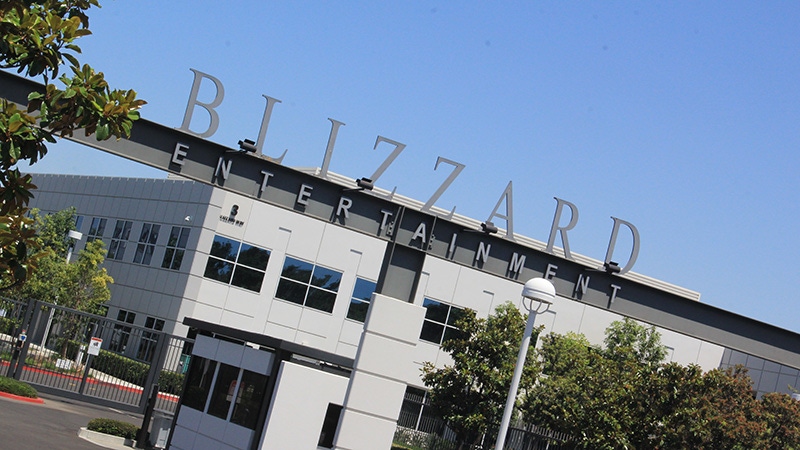Trending
Opinion: How will Project 2025 impact game developers?
The Heritage Foundation's manifesto for the possible next administration could do great harm to many, including large portions of the game development community.
Update: In an email to Game Developer, Activision Blizzard explained its stack-ranking policy that has been employed at the game publisher for several years.

Former Blizzard Entertainment lead software engineer, Brian Birmingham, left the studio after almost two decades in protest over a "toxic" stack-ranking policy that forces managers to hand some employees an unjust appraisal in order to meet a minimum quota.
Birmingham shared the reasoning for his departure online in response to a Bloomberg article, with that report suggesting he left the company after refusing to give a low evaluation to an employee that didn't deserve one purely so he could meet the demands of a stack-ranking system implemented by Blizzard parent company Activision Blizzard King (ABK).
The article states that managers across the company are expected to hand around 5 percent of their workers a "developing" evaluation via the system, which could prevent them from receiving raises or promotions in the near future, while also lowering their profit-sharing bonus.
Bloomberg, which claims to have seen an internal email sent to staff by Birmingham, said the Blizzard veteran refused to work until the company removed the policy, and suggested he may even step down in protest.
"This sort of policy encourages competition between employees, sabotage of one another’s work, a desire for people to find low-performing teams that they can be the best-performing worker on, and ultimately erodes trust and destroys creativity," reads the email.
"If this policy can be reversed, perhaps my Blizzard can still be saved, and if so I would love to continue working there,” Birmingham wrote. “If this policy cannot be reversed, then the Blizzard Entertainment I want to work for doesn’t exist anymore, and I’ll have to find somewhere else to work."
After Bloomberg published its report, Birmingham shared more details on Twitter in a bid to set the record straight, and said he was surprised to see the article given he wasn't asked for comment.
He also, however, added that he believed the quotes contained in the story to be accurate, and publicly derided the stack-ranking system that he explained was initially rolled out in the winter of 2020 at the behest of ABK.
"I'm told the forced stack-ranking policy is a directive that came from the ABK level, above [studio president] Mike Ybarra. I don't know for sure, but I suspect it's true. Everybody at Blizzard I've spoken to about this, including my direct supervisors, expressed disappointment about this policy," he wrote in a Twitter thread.
Birmingham believes ABK was keen to standardize its appraisals process across all three of its subsidiaries–Activision, Blizzard, and King—but noted that Blizzard workers specifically pushed back against the move in 2021.
"Activision, Blizzard, and King all had similar appraisal processes by this point, and ABK wanted to unify them into one. Presumably this was the motivation for enforcing a 5 percent 'developing' rating: to make it match in all three studios. I'm not defending this, only explaining," he continued.
"We at Blizzard pushed back pretty hard in 2021, and I truly believed we had reversed the developing-quota policy. When the sexual harassment lawsuit was revealed later that year, we saw some change following that as well, and it felt like we could make an impact on ABK policies.
"The realization that there's still a minimum quota for 'developing' despite our objections and sternly worded letters leads me to believe I was operating under an illusion. I hope Blizzard's positive culture can overcome ABK's poison, but it isn't succeeding in doing that yet."
Birmingham said he bears no ill will toward his former colleagues at Blizzard, but said the Blizzard he knew and always wanted to work for is currently "being torn apart by the executives at ABK."
He described ABK as a "problematic parent company" that puts developers under pressure to deliver expansions early before depriving those who worked on them of their share of profits using policies such as stack-ranking.
"The ABK team should be ashamed of themselves," said Birmingham, who stressed the Twitter thread is his best recollection of events, and one that spans many years.
Game Developer has reached out to Activision Blizzard for more information on the stack-ranking policy and how it's currently being deployed internally.
Update: An Activision Blizzard representative confirmed to Game Developer via email that the stack-ranking policy is a "broadly supported system" that has been used across the entire company for some time.
"For the past few years we’ve used performance management tools to ensure common standards for assessing performance, reduce bias, and ensure high performers within Activision Blizzard are recognized for their excellent performance.," the email reads.
In addition to providing honest feedback, the policy also gives low performing employees "a plan on how best to improve their own performance."
For Blizzard specifically, the email explains that a "developing" evaluation is another way of saying an employee inconsistently meets expectations, while effectively taking feedback and welcoming opportunities to improve.
Though Activision Blizzard insists the "developing" rating isn't exactly a negative, it also admits that label can be a factor in an employee's chances for promotion. "Performance isn’t just about delivering against goals, but also ensuring employees help foster a great culture."
You May Also Like